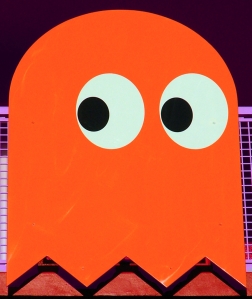I’ve been a fan of video games since my parents got us an Atari in the 1980’s. Then we got a Super Nintendo, and my cousin got a Sega Genesis after that. I’ve played dozens of games on the Wii, and the PS3. Personally my tastes run toward playing the cute games (like De Blob) or the puzzle games (like Tetris or Legend of Zelda), or god help me a cute puzzle game (like Little Big Planet or Katamari Damacy). I’ve never personally been a fan of playing the RPGs or the first person shooter games.
But god help me I love watching other people play them.
Our roommates last year had a PS3 and I must have clocked 100 hours watching my husband and my roommates play through the endless variations of Dragon Age: Origins. I didn’t care that they were replaying it for the sixth time as a different race or a different gender or a different player class. The story was absolutely fascinating every time, and I lost my mind when I saw these choose-your-own-adventure choices led to deadly and sometimes utterly evil consequences.
So this article about BioWare’s Mass Effect being the most important science fictional universe of our generation just reiterated what I already knew: that video games have some of the most complex and amazing narratives of any form of literature that exists today.
At last year’s TEDxLibrariansTO conference I had the pleasure to hear games researcher Sara Grimes talk about her personal experience with video games, and about how video games function as a new and exciting form of narrative storytelling. Here’s her presentation.
To me the BioWare games represent a new level of achievement for video games as narrative. The story lines are sprawling and epic in scope, there are thousands of choices, and there are dozens of alternate endings. There are just so many variables, and so many amazing moments that it was easy for an armchair video game spectator to just sit back with the popcorn and watch the roommates play through the story. Dragon Age was so inspirational that uber-geek girl Felicia Day made a fan-vid series, Dragon Age: Redemption, and BioWare created some downloadable content with that character.
So, when Kyle Munkittrick says that Mass Effect, another BioWare game series, is the most important science fiction universe today, I completely believe it. I have personally never seen anyone play Mass Effect, but from the descriptions he gives in his narrative I can totally understand where he’s coming from.
And that’s why I love these games. The writing is unbelievably good. They hire some incredible voice actors. The visuals are absolutely stunning. It’s as if you’ve been given the keys to an animation studio and a loose script to work with and you just make your own film. The swordplay and the magic is almost secondary to the narrative stream. Sure it’s important that you don’t button mash yourself into oblivion, but these games aren’t about how many things you kill or racking up points for the sake of gaining points. It’s about where you’re going, and how you get there.
Recently one of the BioWare writers was harassed to no end on Reddit because she said that she wants a fast-forward button through combat. This brought out tons of vitriol and hatred, because for many gamers the combat is the point. But clearly it’s not the point for everyone. And thankfully one of the head honchos at BioWare gave a major public statement of support for their writer. Good for them. Because honestly, that’s what makes these games special. The writing is unbelievably good, and it hooks the player as well as everyone else who happens to be in the room into the story line. If they were to abandon that for disconnected gameplay they would lose the soul of their brand.
Sara Grimes in her wrap up suggests that if Libraries are serious about sharing the body of the world’s great literary works that we should not overlook the fact that video games are just as valid a form of literature as a novel. I couldn’t agree more. In fact, I would wager to say that sometimes they’re even better.
